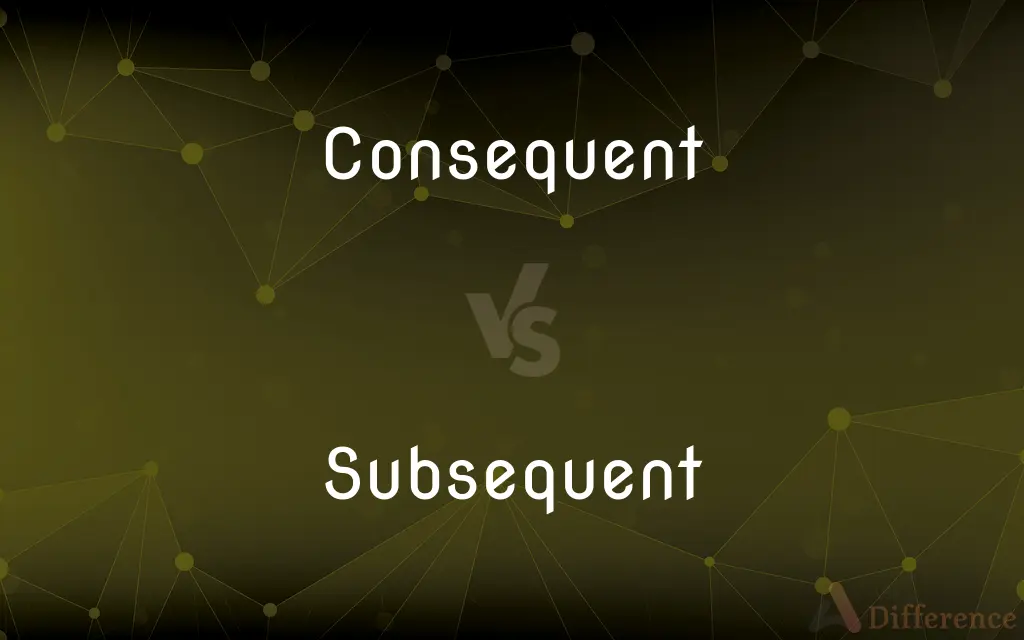Consequent vs. Subsequent — What's the Difference?
By Tayyaba Rehman — Updated on November 1, 2023
Consequent refers to something that follows as a result or effect, while Subsequent means following in time or order.

Difference Between Consequent and Subsequent
Table of Contents
ADVERTISEMENT
Key Differences
Consequent and Subsequent are both adjectives that denote a kind of sequence or order. Consequent, when used, implies a direct outcome or result of a preceding action or condition. For instance, if a cause leads to an effect, that effect is the consequent. On the other hand, Subsequent points to a temporal sequence, meaning something that comes after something else in time, not necessarily as a direct result.
While both terms suggest order, Consequent emphasizes causality. For instance, in a logical argument, if a proposition is true, the consequent would be the outcome of that proposition. Subsequent, meanwhile, doesn't necessarily hinge on causality but on chronology. It's about what comes next, irrespective of a direct cause-and-effect relationship.
In everyday usage, Consequent might be heard in contexts discussing results or outcomes. For example, the consequent damages after an accident. Subsequent is more broadly applied to describe any event, action, or situation following another, such as a subsequent meeting or a subsequent discovery.
In summary, Consequent homes in on cause-and-effect relationships, implying that something is a direct outcome of something preceding it. Subsequent is more about the passage of time, indicating what comes after, regardless of a direct cause.
Comparison Chart
Primary Meaning
Resulting from a cause
Following in time or order
ADVERTISEMENT
Emphasis
Causality
Chronology
Common Context
Logical arguments, outcomes
Events, actions, situations
Dependency
Directly dependent on a preceding action/condition
Not necessarily dependent on a preceding event
Example Usage
Consequent effect of an action
Subsequent event after the main conference
Compare with Definitions
Consequent
Resulting from a specific cause.
The consequent flooding devastated the town.
Subsequent
Succeeding or following as a result.
His subsequent career was remarkable.
Consequent
Necessarily following from the nature of things.
Fire and its consequent heat.
Subsequent
Coming later or after.
Subsequent editions of the book.
Consequent
Inherent in the nature of something.
His genius is consequent to his dedication.
Subsequent
Following in a sequence.
A subsequent visit to the doctor.
Consequent
Forming a logical sequence.
If the premise is true, then the consequent stands.
Subsequent
Occurring after something else in time or order.
The subsequent chapters focus on his youth.
Consequent
A consequent is the second half of a hypothetical proposition. In the standard form of such a proposition, it is the part that follows "then".
Subsequent
In a succeeding or later stage.
Subsequent developments were astonishing.
Consequent
Following as a result or effect
You've got a university place consequent on your exam results
The social problems of pupils and their consequent educational difficulties
Subsequent
Following in time or order; succeeding.
Consequent
(of a stream or valley) having a direction or character determined by the original slope of the land before erosion.
Subsequent
Following in time; coming or being after something else at any time, indefinitely.
Growth was dampened by a softening of the global economy in 2001, but picked up in the subsequent years due to strong growth in China.
Consequent
The second part of a conditional proposition, whose truth is stated to be implied by that of the antecedent.
Subsequent
Following in order of place; succeeding.
Consequent
The second or imitating voice or part in a canon.
Subsequent
Following a line in the earth that is more easily eroded.
Consequent
Following as a natural effect, result, or conclusion
Tried to prevent an oil spill and the consequent damage to wildlife.
Subsequent
(geology) A subsequent stream or faultline.
Consequent
Following as a logical conclusion.
Subsequent
Following in time; coming or being after something else at any time, indefinitely; as, subsequent events; subsequent ages or years; a period long subsequent to the foundation of Rome.
Consequent
Logically correct or consistent.
Subsequent
Following in order of place; succeeding; as, a subsequent clause in a treaty.
Consequent
(Geology) Having a position or direction determined by the original form or slope of the earth's surface
A consequent river.
A consequent valley.
Subsequent
Following in time or order;
Subsequent developments
Consequent
(Logic) The conclusion, as of a syllogism or a conditional sentence.
Consequent
The second term of a ratio.
Consequent
Following as a result, inference, or natural effect.
His retirement and consequent spare time enabled him to travel more.
Consequent
Of or pertaining to consequences.
Consequent
(geology) Of a stream, having a course determined by the slope it formed on.
Consequent
(logic) The second half of a hypothetical proposition; Q, if the form of the proposition is "If P, then Q."
Consequent
An event which follows another.
Consequent
(math) The second term of a ratio, i.e. the term b in the ratio a:b, the other being the antecedent.
Consequent
(geology) A consequent stream.
Consequent
Following as a result, inference, or natural effect.
The right was consequent to, and built on, an act perfectly personal.
Consequent
Following by necessary inference or rational deduction; as, a proposition consequent to other propositions.
Consequent
That which follows, or results from, a cause; a result or natural effect.
They were ill-governed, which is always a consequent of ill payment.
Consequent
That which follows from propositions by rational deduction; that which is deduced from reasoning or argumentation; a conclusion, or inference.
Consequent
The second term of a ratio, as the term b in the ratio a:b, the first a, being the antecedent.
Consequent
Following as an effect or result;
The period of tension and consequent need for military preparedness
The ensuant response to his appeal
The resultant savings were considerable
The health of the plants and the resulting flowers
Consequent
Following as an effect or outcome.
The power outage was consequent to the storm.
Common Curiosities
Can "Subsequent" refer to events unrelated to each other?
Yes, it simply means something that follows in time.
Is every Subsequent action a Consequent one?
No, not every subsequent action directly results from a preceding one.
Can Consequent be used outside logical contexts?
Yes, like in describing outcomes or effects.
Is "Consequent" common in everyday English?
It's less common than "Subsequent" and often used in formal contexts.
Can I say "Consequent years" like "Subsequent years"?
It's less common; "Subsequent years" is the usual expression.
Are Consequent and Subsequent synonyms?
Not exactly; Consequent implies causality, while Subsequent indicates order in time.
In a cause-effect scenario, which word is apt?
"Consequent" would be more appropriate to describe the effect.
In logic, how are Consequent and Subsequent used?
"Consequent" refers to the outcome in a conditional statement. "Subsequent" isn't specific to logic.
Does Subsequent always imply a long gap in time?
No, it can refer to events immediately following others.
What's the opposite of Consequent?
In logical terms, "antecedent" is often the precursor to the consequent.
Does Consequent always point to positive outcomes?
No, it can refer to any outcome, positive or negative.
Are these words used differently in British and American English?
No, their meanings are consistent across both dialects.
Does Subsequent have a causal nuance?
Not necessarily; it primarily denotes temporal sequence.
Can I use "Subsequent" to describe events in the past?
Yes, as long as they followed other events in time.
How do I use "Subsequent" in a sentence?
E.g., "Subsequent meetings further clarified the issue."
Share Your Discovery

Previous Comparison
Pericranium vs. Periosteum
Next Comparison
Master vs. ApprenticeAuthor Spotlight
Written by
Tayyaba RehmanTayyaba Rehman is a distinguished writer, currently serving as a primary contributor to askdifference.com. As a researcher in semantics and etymology, Tayyaba's passion for the complexity of languages and their distinctions has found a perfect home on the platform. Tayyaba delves into the intricacies of language, distinguishing between commonly confused words and phrases, thereby providing clarity for readers worldwide.














































